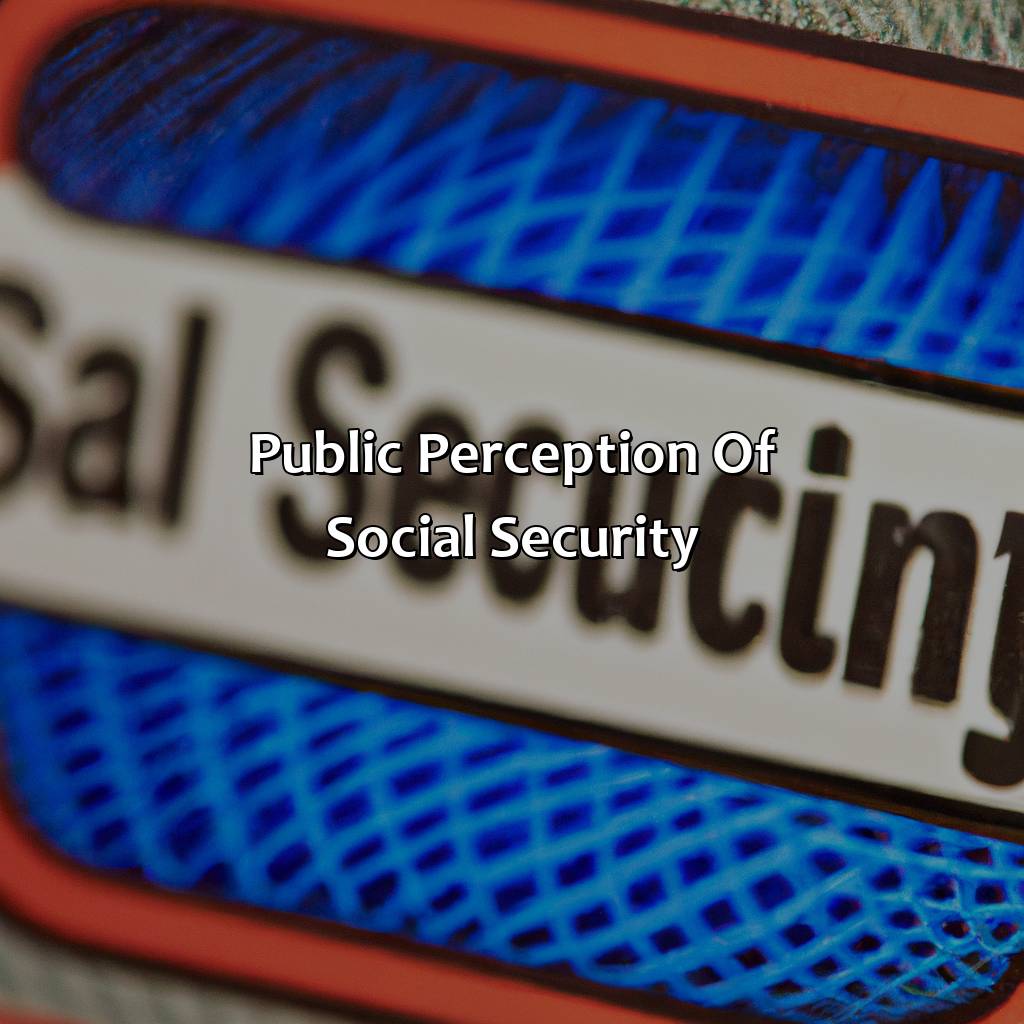Why Is Social Security Called An Entitlement?
Key Takeaway:
- Social Security is called an entitlement because individuals who meet the eligibility requirements are entitled to receive benefits from the program.
- The funding for Social Security comes from payroll taxes that are paid by both employees and employers, and there is ongoing debate about the sustainability of the program in the future.
- The perception of Social Security varies among the public, with some viewing the program as a necessary safety net and others believing that individuals should be responsible for their own retirement savings.
Do you ever wonder what makes Social Security an entitlement? This article will explain the history behind Social Security and why it is considered an entitlement. You can learn why this government program is so important for millions of Americans.
Understanding Social Security
Social Security, an important aspect of retirement planning, is often referred to as an earned benefit or a government program. As the benefits are funded through payroll taxes, people who contribute to Social Security during their working years are entitled to receive benefits after retirement. It is called an entitlement because it is a right that is defined by law and guaranteed to every eligible recipient.
The eligibility for Social Security benefits is based on factors such as age, disability, and work history. The entitlement program is designed to provide a basic level of retirement income and financial protection to those who have contributed to the system. It is an important safety net for millions of Americans, and it plays a critical role in reducing poverty among the elderly.
The Social Security system provides a range of benefits, including:
- Retirement benefits
- Disability benefits
- Survivor benefits
- Supplemental income for those with limited resources
The retirement benefits are calculated based on the average indexed monthly earnings of an individual’s highest-paid 35 years of work. Understanding these benefits and the eligibility criteria is important for effective retirement planning.

Image credits: retiregenz.com by Adam Washington
Definition and Purpose of Social Security
Social Security is a government program developed to help individuals who have reached a certain age or are unable to work due to a disability. It provides financial assistance to individuals in the form of retirement benefits, disability benefits, and survivor benefits. The primary goal of Social Security is to provide a safety net for those who have contributed to the program during their working years.
Social Security is often referred to as an entitlement because individuals who meet certain criteria are entitled to receive benefits under the program. It is not a form of charity, but rather a benefit that individuals have earned through their contributions to the program.
In addition to retirement benefits, Social Security also provides disability benefits to individuals who are unable to work due to physical or mental impairments. This provides financial support to those who may otherwise be unable to support themselves.
Furthermore, Social Security also provides survivor benefits to the families of individuals who have passed away. This program helps to ensure that surviving family members are able to support themselves after the loss of a loved one.
To ensure that Social Security is sustainable for future generations, there are several suggestions that have been put forth. One suggestion is to increase the full retirement age at which individuals can begin receiving benefits. Another suggestion is to increase the amount of income subject to Social Security taxes. These suggestions work by increasing the amount of revenue going into the program and reducing the amount going out, helping to ensure the long-term viability of Social Security.

Image credits: retiregenz.com by David Duncun
Why is Social Security Called an Entitlement?
Why is Social Security called an entitlement? To answer this, let’s look at its system. To get Social Security benefits, you must meet specific conditions. Additionally, the money for Social Security is important when talking about entitlements.

Image credits: retiregenz.com by Yuval Jones
Eligibility for Social Security Benefits
Understanding the Qualification Criteria for Social Security Benefits
To qualify for Social Security benefits, there are several eligibility criteria that must be met. These vary depending on various factors, including age, disability status, work history and income. The primary factor in determining eligibility is an individual’s work history – specifically, how much they have paid into the Social Security system over their lifetime.
For those who meet the necessary qualifications, Social Security benefits can provide critical financial support throughout their retirement years or during times of disability or hardship. Depending on a recipient’s circumstances and eligibility, benefits may include retirement income, disability payments or survivor benefits for spouses and children.
It’s important to note that while individuals who meet these requirements may be entitled to receive Social Security benefits, the program is not considered a form of welfare assistance. Rather, it is an earned benefit that recipients have paid into over many years as part of their working lives.
One such individual whose life was impacted positively thanks to Social Security was Betty Farnsworth from Ohio. Despite having worked all her life and paying into the program every year, she initially didn’t plan to take her survivor benefits until she turned 70. However, after her husband passed away at 72, she realized the importance of proper planning and took those surviving spouse benefits at age 66 instead – providing stability during a time when she was still grieving his loss.
Who needs a retirement plan when you can just hope to win the lottery? Oh wait, that’s not a reliable funding solution for Social Security.
Funding of Social Security Program
The funding for the Social Security Program is generated through payroll taxes paid by employers and employees. These taxes are then placed into the Social Security trust fund, which is used to pay out benefits to retired, disabled, or deceased workers and their dependents. The program is classified as an entitlement because individuals contribute to it throughout their working lives and are entitled to receive benefits once they meet certain eligibility criteria.
It’s essential to note that the Social Security trust fund is expected to face depletion in the future due to demographic factors such as longer life expectancies and a declining birth rate. This means that unless changes are made, future beneficiaries may not receive the same level of benefits as current recipients.
It’s vital for individuals and policymakers alike to understand the importance of preserving and securing the future of Social Security. Without active measures being taken now, future generations may miss out on crucial benefits they’ve contributed to throughout their careers. Therefore, it’s crucial to work towards finding solutions to ensure that this entitlement remains intact for those who need it in years to come.
Social Security: the only thing that makes the phrase ‘security blanket’ sound like a luxury item.
Public Perception of Social Security
To get a grasp on what the public thinks about Social Security, read on! This article covers the Debates and Issues concerning Social Security. Plus, we delve into the Future of Social Security Program. We’ll review the present-day challenges of Social Security and explore what its future might look like.

Image credits: retiregenz.com by Harry Woodhock
Debates and Issues Surrounding Social Security
The discourse surrounding the social security system of a country has always been a topic of controversial discussions, both among politicians and citizens. One of the main points of contention related to this issue is whether or not social security should be considered an entitlement.
Social security is a government-administered program aimed at providing financial support to individuals who are retired or disabled and cannot work. While some argue that receiving these benefits is an individual’s right, others believe that it should be viewed as a privilege rather than an entitlement.
On the one hand, many people believe that social security is not an entitlement since workers pay into the system through their payroll taxes during their working years. According to this view, benefit recipients are simply getting back the money they have already contributed over time. Others argue that eligibility for benefits should only be granted to individuals who demonstrate financial need.
On the other hand, some people view social security as an entitlement program because it guarantees certain benefits to those who meet certain requirements irrespective of their income levels. These benefits may include retirement payments, survivor’s insurance, or disability coverage.
It is worth noting that there are also concerns about the long-term sustainability of social security systems in various countries and how they will adapt to changing demographic trends like aging populations. In such cases, alternative systems such as privatizing or partially privatizing social security have been proposed.
Pro Tip: Understanding the debates and issues surrounding social security can help policymakers craft prudent policies that ensure adequacy and equity in its administration.
Social Security: the only program where the future is more uncertain than the weather forecast.
Future of Social Security Program
The Social Security Program, a critical government initiative that is close to the hearts of American citizens, has been facing perennial issues concerning its sustainability. In the coming years, experts predict that with the increasing demand for retirement benefits, an aging population and budget cuts, this program’s future is uncertain. The U.S. government has been reducing funding for social security programs while simultaneously expanding healthcare services. With these conflicting priorities, it is unclear how the Social Security Program will perform in the future.
That being said, there are still rays of hope regarding the future of the Social Security Program. While the issues around budget cuts and increased demand persist, various analysts have proposed novel ways to improve its viability. For instance, subjecting high earners to higher taxes can serve as a solution to address concerns around dwindling funds that fund this program. Revisiting adjustments to cost-sharing mechanisms could yet be another way available for countries to address dwindling social security options.
It is worth noting that despite its current challenges and uncertainty surrounding its future, it has served as an integral component in generations of Americans’ financial lives, providing them with peace of mind and basic coverage. Although we can only predict what will happen over time – it remains undeniable that sheer dedication and fervor may serve as a silver lining behind every cloud; this rings true within discussions surrounding our nation’s Social Security system.
Five Facts About Why Social Security Is Called an Entitlement:
- ✅ Social Security is considered an entitlement program because individuals who meet certain criteria are entitled to receive benefits. (Source: The Balance)
- ✅ Entitlement refers to the legal right to receive benefits from a government program. (Source: Investopedia)
- ✅ Social Security is funded by payroll taxes and is designed to provide retirement, disability, and survivor benefits to eligible individuals and their families. (Source: The Motley Fool)
- ✅ The amount of Social Security benefits a person is entitled to receive is based on their average lifetime earnings. (Source: AARP)
- ✅ Social Security is a critical source of income for many older Americans and their families, and any changes to the program can have significant impacts on their financial security. (Source: Center on Budget and Policy Priorities)
FAQs about Why Is Social Security Called An Entitlement?
Why is social security called an entitlement?
When people talk about social security, they often refer to it as an entitlement, but what does that actually mean? Essentially, an entitlement program is one that provides benefits to individuals who meet specific criteria, without any limits to the number of people who can receive them. Social security fits this description, as any individual who meets the eligibility requirements can receive benefits.
What are the eligibility requirements for social security benefits?
In order to be eligible for social security benefits, you must have accumulated enough work credits through your employment history. This is determined by calculating your earnings over your lifetime and assigning a certain number of credits for each year worked. Generally, you need to have earned at least 40 credits in order to be eligible.
Are social security benefits based on need?
No, social security benefits are not based on financial need. Instead, they are based on your earnings history and the number of credits you have accumulated. This means that even if you are a high earner and do not necessarily need the benefits, you are still entitled to receive them as long as you meet the eligibility requirements.
What types of social security benefits are available?
There are several types of social security benefits available, including retirement benefits, disability benefits, survivor benefits, and Medicare benefits. Retirement benefits are the most commonly known, and they are available to individuals who have reached a certain age and have accumulated the required number of work credits. Disability benefits are available to individuals who are unable to work due to a disability. Survivor benefits are available to spouses and children of deceased workers. And Medicare benefits provide health insurance coverage to individuals who are 65 or older, or who have certain disabilities.
Is social security funded by taxes?
Yes, social security is primarily funded through payroll taxes, which are paid by employees and employers. The current tax rate for social security is 6.2% for employees and 6.2% for employers, up to a maximum level of earnings. Self-employed individuals are responsible for paying both the employee and employer portions of the tax.
What is the future of social security?
There has been much debate about the future of social security, as the program faces challenges related to funding and demographic changes. Some experts predict that the program may eventually run out of funds, while others believe that changes to the program could help ensure its sustainability. Despite these challenges, social security remains an important program for millions of Americans, and efforts will likely continue to preserve its benefits for future generations.
